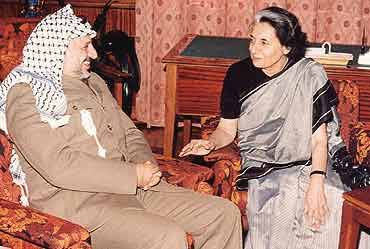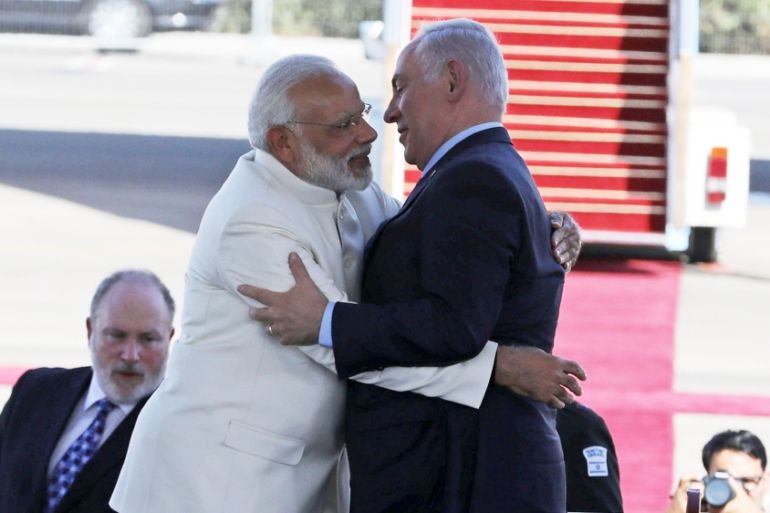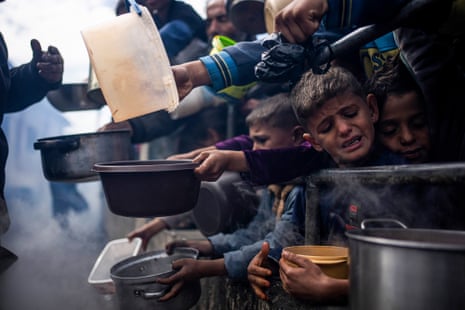
In 1974, India recognized Palestine Liberation Organization (popularly known as ‘Fateh’) as the sole representative of Palestinian people and subsequently in 1988, became the first non-Arab country to recognize the state of Palestine. Throughout this ongoing regional conflict, India has been one of the strongest voices for Palestinian rights. Now, fast forward to 2025, today India is one of mutest voices on the grave issue and is seen as a staunch ally of Israel, that too at a time when the people of Palestine are undergoing a ‘Genocide’ and need its voice the most.
In this Blog, I will highlight how India’s foreign policy and moral standing on the Israel-Palestine issue has transitioned under the Narendra Modi regime and his RSS-Hindutva ideology.
India’s Age-Old Support for Palestinian Cause
The Israel-Palestine conflict, (in current scenario) stems back to over a century, and so does India’s support for the Palestinian cause. In 1938, when the very idea of creation of a Jewish state (eventually Israel) was in a nascent stage, a set of Jewish scholars had also requested Mahatma Gandhi’s support for it. But, he affirmed that though he has all the sympathy for Jews and what they have went through in Europe, he can’t support them in claiming a land which belongs to Palestinians. Mahatma Gandhi said that “one wrong can’t be corrected by doing another wrong” and even questioned why the Jews can’t consider “whichever country they are living as theirs”. “Palestine belongs to the Arabs in the same sense that England belongs to the English or France to the French,” he famously said.
This support for Palestine from the Indian leadership remained rock solid the following years too. For those who don’t know India had voted AGAINST the creation of Israel in 1948 and affirmed the rights of Palestinians on the land. Even after the creation of Israel (though India recognized Israel in 1950), India continued with its steadfast support for Palestine. As I pointed above, India recognized PLO in 1976 and Palestinian state in 1988. Subsequently, in 1996, India opened its Representative Office in Gaza, which was later shifted to Ramallah in 2003.
How close the India-Palestine ties were can be understood by the fact that Yasser Arafat, the late PLO chief, used to call then Indian PM Indira Gandhi her “sister” and even visited India after her assassination and burst into tears. It was only in 1992 that India established diplomatic ties with Israel. Arafat made a visit then as well with a mixed bag of emotions on New Delhi’s slight drift in policy. Despite Israel’s recognition, India’s strong voice for Palestinian rights remained firm. Arafat had even sent an intelligence input to Rajiv Gandhi about LTTE mission before his assassination. Years later, Sonia Gandhi was invited at Arafat’s funeral, though she couldn’t make it due to ‘security reasons’. But, all of this does show the closeness between India and Palestine.

Yasser Arafat had very close ties with Indira Gandhi (Photo: Maktoob)
The Modi-Netanyahu Bonhomie
A big turnaround in India’s stance on the issue came with Narendra Modi’s ascendence to power in India. Modi, who has never shied away from calling Netanyahu his “friend”, became the first Indian Prime Minister to visit Israel in 2017 and also welcome him in India the next year. Though, he also visited Palestine the next year which too was historic in nature – only second by an Indian PM since Jawaharlal Nehru’s pit-stop visit in Gaza in 1960. “India and Palestine’s relations have stood the test of time. I have assured President Abbas that India is committed to the Palestinian people’s interests,” Modi said in Ramallah.
Though, even under BJP, India’s ‘official’ position on the Israel-Palestine issue has remained more or less the same. Earlier, former PM Atal Bihari Vajpayee too had criticized Israel and said that it “needs to vacate the Palestinian lands it has occupied”. In 2017, India voted against US’ decision of recognizing Jerusalem as Israel’s capital. Almost every year, Mr Modi has affirmed rights of Palestinian people on the occasion of ‘International Day of Solidarity for Palestine’. Even on global forums including UN, New Delhi has repeatedly emphasized the need for two-state solution as the only viable solution to the whole conflict.
However, when we come at ground, things at different. Whether it is the local BJP cadre or the IT cell, there has been not just a blind support for Israel but also a huge disregard for the Palestinian people to the extent of dehumanizing them. From BJP leaders and IT cell openly calling out opposition leaders or activists supporting Palestine. Let me point out a few examples:
Priyanka Gandhi coming to the Parliament with a bag showcasing solidarity with ‘genocide’ in Gaza was easily labelled “appeasement politics” by BJP as if there is no value of the lives of women and children being massacred in Gaza. On another instance, Uttar Pradesh Chief Minister and radical Hindu monk, Yogi Adityanath, ‘mocked’ the Opposition for raising solidarity with Palestine and proudly said how many people from his state have been sent to work in Israel (as labours). I don’t know what was there to ‘mock’ except his limited understanding and ugly outlook (will bring a detailed blog on this later). Not just this, on multiple occasions now, solidarity marches for Palestine have been detained and disparaged in different parts of the country (BJP ruled states).

India’s foreign policy has drifted towards Israel under Modi (Photo: Al Jazeera)
Shift In Indian Sentiments On Palestine
There is no doubt in saying that the general stand in India on the Israel-Palestine issue has undergone a lot of transformation over the last decade or so. A major part in this has been played by the current regime, its hard-right politics and the similarities in the ideologies of Hindutva and Zionism. You will easily find right-wing Hindu groups/handles who spew hate against not just Indian Muslims but all around the world, especially against Palestine. If you see properly, those ‘celebrating’ the 2002 Gujarat riots or the 1992 Babri mosque demolition, are also the ones affirming ‘support’ for Israel and mocking the ‘genocide’ in Gaza.
Now, the most stupid logic put forward by a group is that ‘Palestine has never supported India, why should we’. If your support for innocents being killed depends on whether or not, the leaders (present or past) of the region supported India in the past, then it’s not support, but ridiculous selfishness. And, I already pointed out above how close the ties between India and Palestine have been in the past. Also, the WhatsApp forward claiming that Palestine voted in Pakistan’s support in UN over Kashmir issue, is fake…Palestine being a ‘non-permanent’ UN member CAN’T vote at UN.
The other absurd reasoning that you hear is ‘Why sympathy for Palestine but not for Kashmiri Pandits’. Now, this is absolutely apple-orange comparison. There can be no justification behind the brutal killings of Kashmiri Pandits, and I have repeatedly condemned it. But what is the fault of Palestinians behind that exodus?
Yes, there was an event that could be concerning in this aspect. Some Hamas leaders joined a meeting of terror groups in Pak-administered Kashmir last year. But, here too, you can’t put Hamas and all the Palestinians in one bracket. After all, Hamas is not the representative of the whole Palestine and may not remain even of Gazans in a couple of months. Also, I don’t have any sympathy for that terror group which carried out the abhorrent October 7 massacre.

Gaza has been under an abhorrent genocide (Photo: Guardian)
India’s Global Voice and Silence on Palestine
India has always been known for its vocal and strong standing on the issues of global conflicts. India had snapped all bilateral ties with South Africa and joined other countries in ending apartheid (before 1990). India was one the strongest voice for Algeria during the Algerian struggle for independence (1954-62). During the Vietnam war, India was one of the few voices that dared to support the Vietnamese people against the US. Even during Bangladesh’s struggle against Pakistan, India took the firm decision despite global pressure, invaded East Pakistan and liberated India’s eastern neighbour. Afterall, there is a reason why the then Indian leadership was considered one of the pivotal voices among the Non-Aligned Movement (NAM) countries, even when India hadn’t emerged as that big a power globally after independence.
And now compare this to India’s response on the Palestine issue under the current regime. Forget condemning, India has not even uttered a strong word for the Gaza conflict, considering Israeli actions has already been termed ‘genocide’ by the UN. At any global stage, India tries playing it safe with terms like “humanitarian situation”, “ceasefire” just polishing everything under “two-state solution”. India hosted Israeli finance minister Benzalel Smotrich, a man under global scrutiny for his role in expanding Israeli settlements in West Bank and might host ‘war criminal’ (warrant issued by ICC) Netanyahu later this year.
An Al Jazeera report found that Indian defence companies exported weapons including rocket launchers, drones and weapons systems to Israel, even while the latter was carrying out a genocide in Gaza. Now, I’m pretty sure that Indian leaders and foreign ministry are not that naive that they don’t know what the weapons will be used for. For the height of the matter, India’s foreign minister S Jaishankar defended this move calling it exercise of ‘national interest’. Well, I wonder if Mr Jaishankar would’ve the same opinion on Turkiye’s arm export to Pakistan days ahead of conflict with India this year. This is absolutely opportunist, selfish and spineless display of foreign policy from my country, and I can’t help but calling it out.
India, under the current leadership, never fails to self-proclaim itself as ‘Vishwaguru’ (teacher of the world) and Voice of the Global South. But, when it comes to perhaps the gravest humanitarian situation in the world today, it’s voice is mute. Netanyahu, during his UN address last month, said many countries that criticize Israel publicly, praise him privately…well, I won’t be surprised if one such name is that of India’s honourable prime minister. Recognition of a Palestinian state became quite an issue recently. Fortunately, India already recognizes Palestine (since 1988), because had that hard choice had to be made today, I am pretty confident today’s hollow, opportunist and self-boasting leadership couldn’t have made it.
Today, Gaza has been turned into rubble with nearly 70,000 deaths of which 50,000 are women and children. Raids and killings in West Bank have continued on rampage under the Israeli occupation. My heart goes out for Palestinians, both in West Bank and Gaza, who continue to struggle for a simple humane recognition, while the whole world including India looks the other way. There have been quite a bit of development on the ceasefire front, but I would wait on writing a blog till I see some material progress on ground. At the end, I just hope my own country, known for its strong moral standing, mends its ways and provides the voice, Palestinians need today at the global stage.

